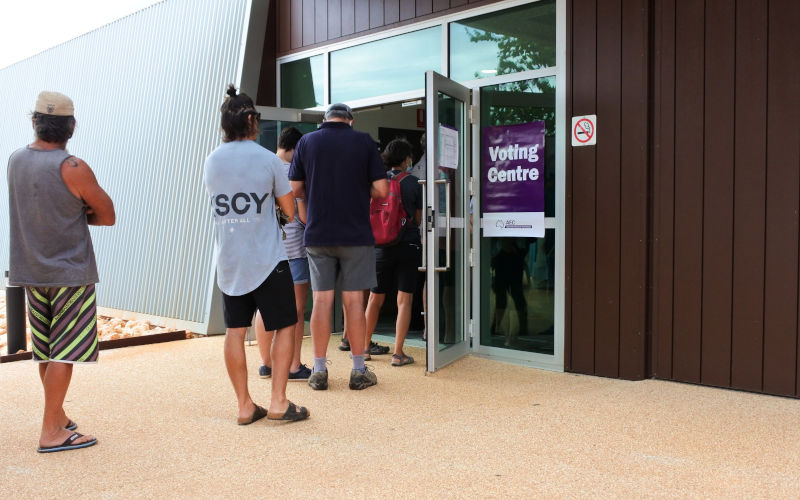Opposition to the AUKUS deal among rank and file Labor supporters and similarly aligned voters is increasing by the day.
It’s not simply because AUKUS is a malignant inheritance from the Morrison government that people who voted Labor at the last election are expressing their alarm about it today. On every level it is so obviously crazy – the absurd expense, the dangerous alliance entanglements it imposes on us, the unrealistic time-lines, what it means for Australia’s trade with China, what it means for the relations with our strategically important neighbours in the Asia Pacific, and so on. And then there are those egregious self-serving lobbyists with their snouts in the AUKUS trough (think Pyne, Hockey).
However, the growing opposition among Labor’s rank and file reflects more than these negative factors related to AUKUS. It points to a divide opening up in Australian politics between the political class and a substantial and growing proportion of voters. It is a divide, moreover, that is not unique to this country. In significant part it is a generational divide.
It also reflects the fact that more and more voters are increasingly alert to what is happening in politics, nationally and internationally. Younger voters and more informed voters are demanding a new politics. Entrenched in the old politics, the existing political class is much too comfortable with the status quo. They’re a bit like the aristocracy in France in 1789: blind to a revolution bearing down upon them.
The fact is that we’re coming to the end of the era of predominantly white male political elites competing for power in representative governments around the world. That is old politics in which the elites lap up the perks of office, while their primary objective is to keep the ship of state on a steady-as-she-goes trajectory. There is next to nothing progressive about the old politics as demonstrated by the “lucky country’s” dull and often regressive record of public policy since Menzies to the present. The contrast with Scandinavia’s public policy record could not be more stark.
Prime Minister Albanese and Opposition Leader Dutton epitomise the old politics.
A small illustration of Albanese’s generational irrelevance was his grovelling trip to the UK to attend the coronation of Charles III. It boggles the mind that a Labor Prime Minister would be part of such antediluvian nonsense. He shouldn’t have gone near it. If Australia had to be represented, it could have been left to the ponderous Governor-General and his warbling wife, with absolutely no hangers-on in tow. (Don’t forget the more than $750 a night for hotel rooms for the more than a dozen or so hangers-on who went along for the ride.)
Dutton’s addiction to the old politics is plainly on show in his opposition to the Voice to Parliament. And his generational irrelevance is evident in the cold cynicism that characterises his reactions to every progressive policy that comes his way – consider his obdurate stand on climate change, his determination to safeguard the toxic Morrison policy legacy, his patronising attitude to women’s equality, his racist remarks about “African gangs” terrorising Melbourne’s restaurant goers, his recalcitrant response to Kevin Rudd’s apology speech to the Parliament (since opportunistically backtracked). Dutton is the old politics writ large.
At the last federal election younger voters made it clear that they hold the old politics in contempt. While they punished the Liberals by significantly voting for Teals and Greens, they were not all that enthusiastic about Labor either. Remember that the Albanese government has a bare majority in the House of Representatives, and it lacks a majority in the Senate.
And it wasn’t just young voters who are being turned off by the old politics. Women, including a majority of professional women, educated voters, and principled voters demanding an end to the corruption, sexism and subterfuge that are the face of the old politics, have rejected the major parties in droves – for example, by objecting to the overbearing attitude of the major political machines that seek to parachute their preferred candidates into electorates in defiance of the wishes of members in local branches.
The irony is that all this is well known by the party machines, but they are incapable of reforming themselves. They’ve got far too much skin in the game. They will not change.
AUKUS is becoming a rallying point for those who are fed up with the old politics. Local ALP branches, and possibly state conferences, are rising up to condemn the Albanese government’s morally flawed commitment to the project. Indeed that commitment is likely to become counterproductive for the government at the next election. Nor will it win voters over to Dutton – or whoever else leads the Liberals by then (Hastie?). This is because AUKUS exemplifies everything that is wrong with the old politics.
It was conceived in Washington and London, in part to block the French from delivering the submarines which Australia had ordered. (Remember Macron’s statement about Morrison lying to the French.) The Pentagon and Whitehall cunningly connived to bring Morrison on board. He was easily bought. That he was the junior partner in the whole shebang was made very clearly evident when Joe Biden forgot Morrison’s name at the grand announcement of AUKUS’s birth.
Nonetheless, Morrison saw AUKUS as an opportunity to big-note himself on the world stage. He engaged in most of the initial negotiations in secret, even keeping members of his Cabinet in the dark (which was his wont). Even today he sees himself as the father of AUKUS. He fails to understand that he is just another Billy Hughes in Australian politics. At the Paris Peace conference in 1919, Hughes was handled like a puppet by the British and French governments urging him on to alienate the Japanese – which he did, to disastrous effect. The similarities between Hughes and Morrison are quite remarkable. Both were the slaves of their own egos. Both were inimical to Australia’s security interests.
Opposition to AUKUS is spreading, not only through Labor’s rank and file, but among the very voters who rejected the old politics at the last election. At the next election there will be many more of those voters. They are likely to vote Green or Teal, or for other independents, if they are convinced that AUKUS is the madness that it is. This will probably result in a minority Labor government. That could spell the end of AUKUS, a development that is devoutly to be wished for.
And even if that doesn’t happen, it is more than likely that a renewed Trump administration in the US would end it for us.
Dr Allan Patience is an honorary fellow in political science in the University of Melbourne.

